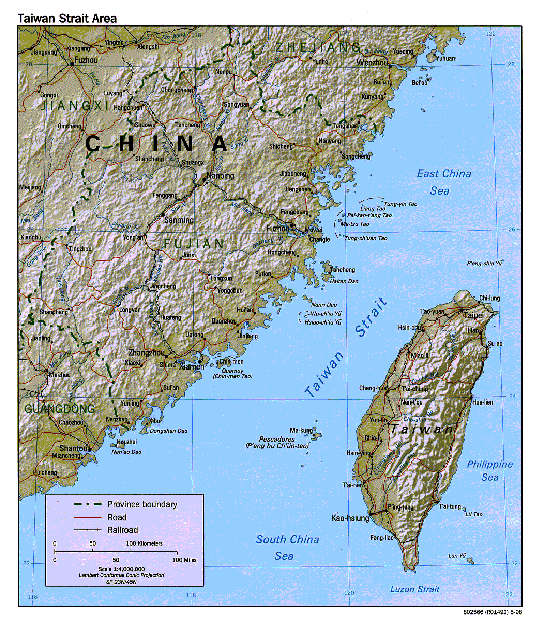
The Mainland looms over 23 mln Taiwanese Source: Google Images
The government of China has expressed indignation over the Obama administration’s decision to sell $6.4 billion in defensive weapons to Taiwan. Taiwan is part of China, Beijing argues, and the U.S. is meddling in a domestic dispute. See article on the arms deal.
Obama — with no “reset” button on China — is acting in accordance with the 1979 Taiwan Relations Act, which was passed after Jimmy Carter chose the Mainland over Taiwan as the “one China” the U.S. would recognize. The Act nonetheless provided for a defensive arming of Taiwan. With Reagan in power in the 1980s, the opening to China was not reversed, but the U.S. government “assured” Taiwan it would not recognize Beijing’s sovereignty over Taiwan without negotiations, even though the U.S. position remained that there was only one China. When I was a US foreign service officer in the 1990s, I remember one of my colleagues having to “resign” temporarily from the foreign service in order to represent the US in its non-embassy in Taipei (called the “American Institute in Taiwan”). More diplomatic gymnastics than Nadia Comaneci.
The Obama administration, like previous American administrations, heard back from Beijing that this arms transfer would harm US-Chinese relations. The Chinese weren’t even impressed that President Obama decided not to sell F-16s to Taiwan. Perhaps these could be construed as offensive weapons. As crazy John Mearsheimer’s crazy Offensive Realism theory would have it, you can’t trust anyone out there because all weapons, even defensive ones, can be used offensively. Mearsheimer should be feted in Beijing for this reason, just as he is in Beirut and Ramallah. Well, F-16s can be deployed as offensive weapons, John, but the weapons going to Taiwan — helicopters, Patriot missiles, minehunters and communications equipment — are not exactly the basis of a blitzkrieg. One wonders if a President McCain would have sold Taiwan the F-16s.
The deal seems sizable, though I am no defense analyst, but only a modest economist/political analyst. Still, Taiwan is not among the largest purchasers of US weaponry. On an annual basis, the top ten acquirers of US arms in 2008 in descending order were: Israel (just as you suspected, John), Saudi Arabia, South Korea, Egypt, Poland, Canada, Iraq, Turkey, Jordan and Pakistan, according to data compiled by the Federation of American Scientists. (Add up all the arms purchased by states Israel has shaky or no diplomatic relations with, John and Steve, and you may understand why the US supplies such a level of arms to Israel — but after all, this post is about Taiwan!)
According to data compiled by the Stockholm International Peace Research Institute (SIPRI), a purveyor of lots of defense-related data, the top ten arms exporters in 2007 in descending order were: the U.S., Russia, Germany, France, the Ukraine, the Netherlands, the UK, South Korea, Italy, and Sweden (found on Wikipedia). SIPRI also lists the top 10 defense budgets in 2008, spent predominantly on domestic forces: the US, China, France, the UK, Russia, Germany, Japan, Italy, Saudia Arabia, and India. Here, the US dwarfs everyone, spending over 7 times as much as the number two largest defense spender, China, and over $80 billion more than the 9 next largest spenders combined. Does this mean Taiwan is safe? For now perhaps.
China is the 800-pound gorilla, so one understands why most nations see the gorilla as the one and only China. However, with such a fuss made by Wilsonian defenders of the self-determination of peoples — witness support for Kosovar, Palestinian, Georgian, and other minority rights — why has the world given the shaft to 23 million Taiwanese? They clearly do not want to become part of the one-party state that governs 1.3 billion people across the straits. I am no Barry Goldwater, but we should ask this question nonetheless. Henry Kissinger didn’t, but we should.